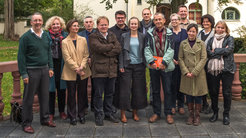Visegrád Anthropologists’ Network
Inaugural meeting at the Max Planck Institute for Social Anthropology
The "Visegrád" countries – Poland, Slovakia, the Czech Republic, and Hungary, also known as the V4 – have had a bad reputation of late in the Western media. These countries came together in 1991 on the basis of historical affinities dating back to the Middle Ages. In the postsocialist decades, they display similarities in their economies, political institutions and social structures – but also in increasing nationalism and Islamophobia. For many observers, especially in Hungary and Poland, pluralism and the rule of law have been under threat for years. There has been relatively little comparative anthropological research into contemporary developments in the V4 (a dubious club to which former East Germany may be added as an honorary member, since many of the same suspect phenomena are all too evident here, not least in voting patterns). The Visegrád Anthropologists’ Network (V4Net), initiated by Chris Hann, director of the Department 'Resilience and Transformation in Eurasia' at the Max Planck Institute for Social Anthropology, aims to fill this gap by shedding new light on social realities in this region. The inaugural meeting of the network took place at the Institute on Monday, 9 October 2017.

Perceptions, realities, and underlying social causes
Since 2004 the Visegrád states have enjoyed all the benefits of EU membership, yet they have been reluctant to share the burden of the "migrant crisis" that erupted in 2015. It is not just political solidarity with the EU that is judged to be lacking: Western politicians and journalists bemoan rampant xenophobia in East-Central Europe, when humanitarian sympathy with refugees is called for. Viktor Orbán and Jarosław Kaczyński are depicted as demagogues, manipulating the media and amending constitutions in order to undermine the independence of the judiciary. A generation after the collapse of socialism, democracy itself seems to be threatened.
"Such hasty judgements and stereotypes must be questioned", says Prof. Chris Hann. "I am especially interested in tracing grassroots social changes taking place within the Visegrád region. Various sectors of labour migration to the West have been well documented, from agriculture to hospitality and the care sector, both private and public. We know the root causes of this exodus: even where jobs are available in the homeland, the wages are abysmal, insufficient even to support household reproduction. But we don’t know very much about what is happening to families and neighbourhoods in the villages and towns which these emigrants leave." At the inaugural meeting, anthropologists from the Visegrád states were joined by Western specialists on the region to discuss the present state of research and the priorities for future investigations.
"Right-wing, populist mobilization in Eastern Europe is currently attracting a great deal of attention, from anthropologists as well as other scholars", Hann observes. "This is quite right, it’s an important issue, but to grasp it adequately we need to widen the context. There are plenty of topics where more research is urgently needed – for example, into the social impact of EU transfers and of transnational investors like Mercedes-Benz. Remuneration patterns, payment practices and taxation strategies in enterprises owned by native entrepreneurs should also be examined, together with continuities with the shadow economy of the socialist era which are still widespread in some sectors. A lot of work has already been done on social memory and nostalgia, the manipulation of historical symbols, the branding of exemplary national products, and the staging of new rituals; but here too, in the understanding of subjectivities and emotions, as we move forward in the second postsocialist generation, there is a need for innovative anthropological research. Perhaps we should pay more attention to the expectations and aspirations of younger cohorts."
With a mix of empirical projects exploring both political economy and changing social relations and notions of personhood, the aim is to create a solid foundation to address larger conceptual questions concerning trust and morals in states that used to be on the periphery of the Soviet empire and now find themselves structurally marginalised by the EU and global capitalism.
On-going collaboration with Visegrád specialists
It is intended through this initiative in the years 2017-2021 to build up a network that will support increased collaboration between researchers – doctoral candidates and post-docs as well as established scholars – at leading centres of anthropological research in the Visegrád countries. In addition to arranging regular conferences and workshops, the network will facilitate mobility between all the participating institutes. "Senior and junior members alike will be encouraged to spend time at the Max Planck Institute for Social Anthropology, to work on their own projects as well as to provide stimulus and guidance to our own researchers", Hann says.
Participants at the inaugural meeting:
Buzalka, Juraj (Comenius University, Bratislava)
Feischmidt, Margit (Hungarian Academy of Sciences, Budapest)
Halemba, Agnieszka (University of Warszawa)
Hann, Chris (Max Planck Institute for Social Anthropology, Halle/Saale)
Kürti, László (University of Miskolc)
Lubaś, Marcin (Jagiellonian University Kraków)
Makovicky, Nicolette (University of Oxford)
Mikuš, Marek (Max Planck Institute for Social Anthropology, Halle/Saale)
Pine, Frances (Goldsmiths, University of London)
Pusztai, Bertalan (University of Szeged)
Soler, Elena (Charles University Prague)
Sosna, Daniel (University of West Bohemia, Plzeň)
Stewart, Michael (University College London)
Thelen, Tatjana (University of Vienna)
Founder members unable to attend on the day:
Broz, Ludek (Czech Academy of Sciences, Prague)
Buchowski, Michał (Adam Mickiewicz University, Poznań)
Henig, David (University of Kent at Canterbury)
Lis, Aleksandra (Adam Mickiewicz University, Poznań)
Malewska-Szałygin, Anna (University of Warszawa)
